어제 관람한 연극, 남북한정상회담의 무대는 일찌기 본적이 없었던, 찬란한 무대장식이었었다.
영화, 연극들을 보면서, 관객들은 웃기도하고 울기도한다. 동정도하고, 분노도 한다.
그러나 정작 영화나 연극의 소재로 쓰인,주인공이 된 심정을 사려깊게 이해하고, 또 그자신이 영화,연극속의 주인공이었다면? 하고 입장을 바꾸어 생각하기는 쉽지않다.
4월27일,2018년, 남북한간, 정상회담내용을 미디아를 통해서 보는 한국인들과 세계인들의 표정을 보면서 희망을 갖어 보기도하고, 분노도 해봤다. 단 북한 주민들은, 보도 통제로 그내용을 알지 못하고 있는것으로 이해하고 있기에, 관객으로서의 느낌이 없었을 것이기에 언급을 제외시켰다.
세계사람들은 판문점의 이역사적 회담을 관객의 입장에서 관람한것으로 이해하고 있는것으로 생각된다.
그러나 정작 이역사적 회담의 주인공들은 한국민들과 북한인민들이다.
관람객인 세계사람들은 두정상의 만남과 회담발표를 보면서, 모두가 풍선을 띄우는것 처럼 희망과 찬사를 아낌없이 보내고 있는것을 보면서, 같은 사람인데, 입장에 따라 이렇게 많이 각도가 다르다는것을 봤다.
문제는 이러한 세계인들의 관객속에, 한국민들이 그속에 있다는점이고, 그들과 똑같이 희망과 찬사를 보내고 있다는점이다. 관객인 세계사람들은 이시간이 역사속으로 스며든뒤에는 까맣게 잊어버리고 산다.
그러나 한국민들은 이회담(연극)의 주인공들이기에 세상을 살아가는동안에는, 기쁨과 괴로움을 항상 피부로, 일상생활에서 느끼고, 때로는 불안과 때로는 희망속에서 살아가는 입장이다. 이런차이점을 한국민들은 분명히 인식하고, 분홍빛 희망과 한반도의 평화에 대한 평가를 유보하고, 신중하게 지켜봤어야 했다. 불행하게도 관객인 세계사람들보다 더흥분하는 모양새를 보면서, 나는 이렇게 느꼈었다.
"과거 좌파 정권( 김대중, 노무현)때도 이번 정상회담과 똑같은 정상회담을 했었고, 그때도 한국민들은 희망과 평화가 금방 올것이라는 환상에 사로잡혀, 하루아침에 남북한사이에는, 전쟁과 투쟁이 있을것이라는 상상도 하지 않았었던 쓰라린 경험을 했었기 때문이다"
그뒤에 한반도 상황은 어떻게 변천해 왔는가는 다시 설명할 필요가 없이, 한국전이후 최대의 위기를 겪어오면서 오늘에 이르렀었다.
바라건데, 춤추고 장구치는일은 지금으로 부터 최소한 1년후에 해도 늦지 않다. 회담에서 만들어진 이행 사항의 실천을, 그때쯤에는 윤곽이 잡힐수 있기 때문이다. 제발 한국인들이여, 자제 하시라.
다시 강조하는데, 영화, 연극 관객과, 실제 모델로 쓰인 주인공의 삶의 아픔과 희망을 느끼는데는 하늘과 땅만큼이나 차이가 있다는점을 꼭 기억했으면 한다.
아래의 기사는, 미국의 CNN, BBC 관객들이, 정상회담이라는 영화를 어제 본후 그 감상문을 쓴것이다.
참고 삼아 모든 한국민들은 읽어봤으면 하는 바램이다.
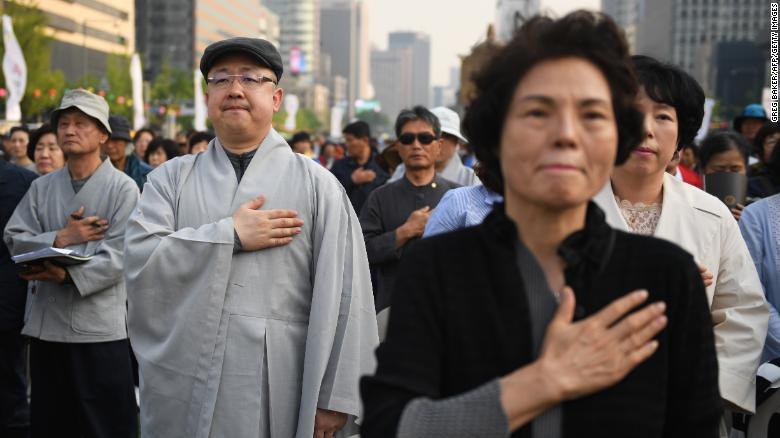
https://www.cnn.com/2018/04/28/asia/korea-summit-seoul-reaction-intl/index.html
http://www.bbc.com/news/world-asia-43932405
영화, 연극들을 보면서, 관객들은 웃기도하고 울기도한다. 동정도하고, 분노도 한다.
그러나 정작 영화나 연극의 소재로 쓰인,주인공이 된 심정을 사려깊게 이해하고, 또 그자신이 영화,연극속의 주인공이었다면? 하고 입장을 바꾸어 생각하기는 쉽지않다.
4월27일,2018년, 남북한간, 정상회담내용을 미디아를 통해서 보는 한국인들과 세계인들의 표정을 보면서 희망을 갖어 보기도하고, 분노도 해봤다. 단 북한 주민들은, 보도 통제로 그내용을 알지 못하고 있는것으로 이해하고 있기에, 관객으로서의 느낌이 없었을 것이기에 언급을 제외시켰다.
세계사람들은 판문점의 이역사적 회담을 관객의 입장에서 관람한것으로 이해하고 있는것으로 생각된다.
그러나 정작 이역사적 회담의 주인공들은 한국민들과 북한인민들이다.
관람객인 세계사람들은 두정상의 만남과 회담발표를 보면서, 모두가 풍선을 띄우는것 처럼 희망과 찬사를 아낌없이 보내고 있는것을 보면서, 같은 사람인데, 입장에 따라 이렇게 많이 각도가 다르다는것을 봤다.
문제는 이러한 세계인들의 관객속에, 한국민들이 그속에 있다는점이고, 그들과 똑같이 희망과 찬사를 보내고 있다는점이다. 관객인 세계사람들은 이시간이 역사속으로 스며든뒤에는 까맣게 잊어버리고 산다.
그러나 한국민들은 이회담(연극)의 주인공들이기에 세상을 살아가는동안에는, 기쁨과 괴로움을 항상 피부로, 일상생활에서 느끼고, 때로는 불안과 때로는 희망속에서 살아가는 입장이다. 이런차이점을 한국민들은 분명히 인식하고, 분홍빛 희망과 한반도의 평화에 대한 평가를 유보하고, 신중하게 지켜봤어야 했다. 불행하게도 관객인 세계사람들보다 더흥분하는 모양새를 보면서, 나는 이렇게 느꼈었다.
"과거 좌파 정권( 김대중, 노무현)때도 이번 정상회담과 똑같은 정상회담을 했었고, 그때도 한국민들은 희망과 평화가 금방 올것이라는 환상에 사로잡혀, 하루아침에 남북한사이에는, 전쟁과 투쟁이 있을것이라는 상상도 하지 않았었던 쓰라린 경험을 했었기 때문이다"
그뒤에 한반도 상황은 어떻게 변천해 왔는가는 다시 설명할 필요가 없이, 한국전이후 최대의 위기를 겪어오면서 오늘에 이르렀었다.
바라건데, 춤추고 장구치는일은 지금으로 부터 최소한 1년후에 해도 늦지 않다. 회담에서 만들어진 이행 사항의 실천을, 그때쯤에는 윤곽이 잡힐수 있기 때문이다. 제발 한국인들이여, 자제 하시라.
다시 강조하는데, 영화, 연극 관객과, 실제 모델로 쓰인 주인공의 삶의 아픔과 희망을 느끼는데는 하늘과 땅만큼이나 차이가 있다는점을 꼭 기억했으면 한다.
아래의 기사는, 미국의 CNN, BBC 관객들이, 정상회담이라는 영화를 어제 본후 그 감상문을 쓴것이다.
참고 삼아 모든 한국민들은 읽어봤으면 하는 바램이다.

South Koreans pray Friday in Seoul for the success of the inter-Korean summit.
Seoul, South Korea (CNN)South Koreans woke to a political reality Saturday that seemed improbable if not impossible only months ago.
In downtown Seoul, the giant smiling face of Kim Jong Un stared down at pedestrians from a billboard-sized TV screen.
Usually
when the North Korean leader appears on screens in the South Korean
capital, it is a sign of danger and high tensions on the Korean
Peninsula: nuclear tests, missile launches, or promises of annihilation.
But on Friday, in a moment that few had ever expected to see, Kim was talking of peace and reconciliation.
The image of Kim shaking hands with South Korean President Moon Jae-in,
the first meeting between leaders of the two countries in more than ten
years, could be seen everywhere in Seoul again Saturday, a reminder
that, yes, it really did happen.
The
two leaders "solemnly declared before the 80 million Korean people and
the whole world that there will be no more war on the Korean Peninsula
and thus a new era of peace has begun."
"There
is no more war," read the headline of Korea's Hankyoreh newspaper
Saturday, underneath a full-page photo of Kim and Moon, hand in hand stepping over the military demarcation line (MDL) which has separated the two countries since the end of fighting in the Korean War in 1953.
The landmark deal signed by the two leaders Friday wasn't the Berlin Wall coming down -- the demilitarized zone (DMZ) between the Koreas remains, and there are many, many issues to solve
before anything approaching reunification -- but it had something of
that historical weight, and has left even the most cynical of South
Koreans feeling genuinely optimistic about their country's future.
Pent up emotion
For
generations of men and women South of the border, the war and the
accompanying threats of military attack have been an ever-present fact
of life.
There are more than
3,000 bomb shelters in Seoul, every man between the ages of 18 to 35 has
to serve in the military for two years, and the city plays host to tens
of thousands of US troops.
No
South Korean will tell you they are unaware of the dangers, but at
times the capital can feel wholly removed from its belligerent neighbor,
existing in another world, even when there is talk of artillery shells
raining down on the city from Pyongyang.
Before
Friday, many would have said this was because South Koreans just want
to get on with their lives -- they didn't build the world's eleventh
largest economy by worrying about war everyday -- but the reaction to
Kim and Moon's handshake hinted at a degree of pent up anxiety and
denial, which for some came out in floods of emotion.
"In
theory, we have an armistice but the atmosphere ... is actually quite
frightening when there's nuclear tests and missile launches," Jang
Gyu-won, 23, told CNN.
In central
Seoul, where crowds had amassed the previous day to cheer the
announcement, the mood Saturday morning remained jubilant.
Lee Bong-joo, 52, whose late father was from North Korea, said she was "so happy such an occasion took place."
"I
hope there will be good news soon so I can go to my father's hometown
and do a memorial service for him there," she said. "He wanted to meet
his separated family (in the North), but couldn't, and passed away while
waiting. He really wanted to go back to his hometown."
Friday's
agreement also included a commitment to reunite families separated by
the war with family reunion programs to resume on later this year.
On
the other side of the DMZ, North Koreans, who have been kept largely in
the dark throughout the apparent rapprochement, were also waking up to
the news of the successful summit.
"The
historic Panmunjom Declaration accomplished a comprehensive and
groundbreaking development in the North-South relationship in line with
the whole nation's demand and desire for peace and the unification of
the Korean Peninsula," the state-run Korean Central News Agency said,
referring to the agreement by it's official name.
What happens next
But
promising peace and full denuclearization -- as the Panmunjom
Declaration does -- is one thing, achieving it is quite another.
Friday's
meeting was all about the Koreas, and the declaration includes language
about the importance of the countries deciding their future "on their
own accord," but a true solution to the crisis on the peninsula will
require buy-in from the US, China and much of the rest of the
international community, which has subjected North Korea to stringent
economic sanctions as it sought to build its nuclear program.
Kim
has already met with Chinese President Xi Jinping, and will sit down
for an historic summit with US President Donald Trump later this year,
placing the fate of the Koreas largely in the hands of the US leader.
Trump -- who many, including Moon himself, have given credit for the meeting taking place at all -- was triumphant on Twitter, writing "KOREAN WAR TO END!" and praising Xi for his assistance.
Chinese
Foreign Ministry spokeswoman Hua Chunying applauded the "historic
moment of the North and South Korean leaders crossing the military
demarcation line" and quoted an ancient Chinese poem: "Disasters are
never powerful enough to separate real brothers, and a smile is all they
need to eliminate the hard feelings."
A
peace treaty to officially end the Korean War may be the easiest thing
to arrange, but even that will require many more parties than just the
Koreas. When war broke out on the Peninsula in 1950, the US, under the
banner of the United Nations, and China were both major belligerents.
Both
are parties to the armistice agreement, signed in 1953, which ended
hostilities, along with North Korea but not South Korea, whose strongman
leader Syngman Rhee refused to sign, though he could not stop his US
sponsors from doing so.
Under the
new Panmunjom Declaration, Moon and Kim agreed to work towards
"quadrilateral meetings involving the two Koreas and the United States
and China with a view to declaring an end to the War and establishing a
permanent and solid peace regime."
Travis
Jeppesen, author of "See You Again in Pyongyang," said "in the coming
months, we can expect more North-South engagement in the realms of
sports and culture, and eventually commerce, education, and tourism."
"These
steps, combined with diplomatic engagement, will slowly but surely lead
to the empowerment of the North Korean people," he added.
Major sticking point
The
US and China have both indicated support for formally ending the war,
but it remains to be seen if the much larger hurdle of denuclearization
will stymie those efforts.
What all parties exactly mean by denuclearization has always been a sticking point in discussions between North and South Korea, and North Korea and the US.
The
Koreas have reached agreements in the past. They have hosted successful
summits in the past, and raised hands and pledged cooperation and
solidarity, but the fundamental disputes have remained unsolved,
eventually scuttling any momentum towards true peace.
Speaking
to CNN at a secure location in Seoul before the summit, North Korea's
former deputy ambassador to London, Thae Yong-ho, warned Pyongyang may
not be willing to countenance the type of stringent inspections needed
to verify full denuclearization.
"I
really doubt whether America can force Kim Jong Un to accept the
complete, verifiable and irreversible denuclearization (CVID)
principle," he said.
"For North Korea, if they accept the CVID then that's the end of the North Korean system."
He
explained that true CVID requires inspectors to be given unfettered
access to the country, without restrictions or prior approval. North
Korea, with multiple large camps for political prisoners, and top secret
military bases, would be unlikely to allow inspectors to roam around
unsupervised.
"There are many
places North Korea cannot actually open to the world," he said. "How can
you be sure that North Korea does not hide its (intercontinental
ballistic missiles) in those areas? Real and genuine CVID must mean
complete access."
Vicious cycle
Pyongyang
will also argue, justifiably many would say, that it should not have to
give up its nuclear deterrent while the threat of US nuclear attack
remains.
Until 1991 the US maintained nuclear weapons in South Korea, and the country is still within the wider US nuclear umbrella.
"Since
the Korean War, the US has maintained a policy of protecting South
Korea with its nuclear weapons, and the potential of a pre-emptive
nuclear strike against North Korea," said Wol-san Liem, Director of
International and Korean Peninsula Affairs at the Korean Federation of
Public Services and Transportation Workers' Unions.
"On
top of that, on a regular basis the US and South Korea conduct military
exercises which are about toppling the North Korean government."
Pyongyang
has long viewed those exercises as a direct threat, and Liem added that
"all of that militarization, the hostile policy towards North Korea and
the fact that there is still a state of war, is part of a vicious
cycle."
"We have to figure out how
to stop the vicious cycle, but it can't be one sided," she said. Failing
to go through any "trust building steps" with North Korea could result
in everything falling apart, she warned.
https://www.cnn.com/2018/04/28/asia/korea-summit-seoul-reaction-intl/index.html
http://www.bbc.com/news/world-asia-43932405

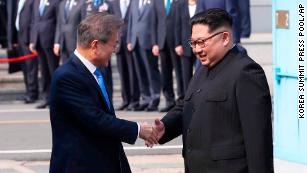
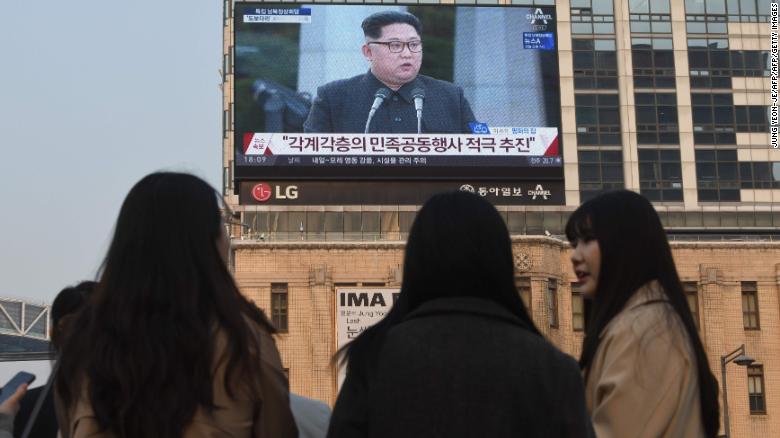
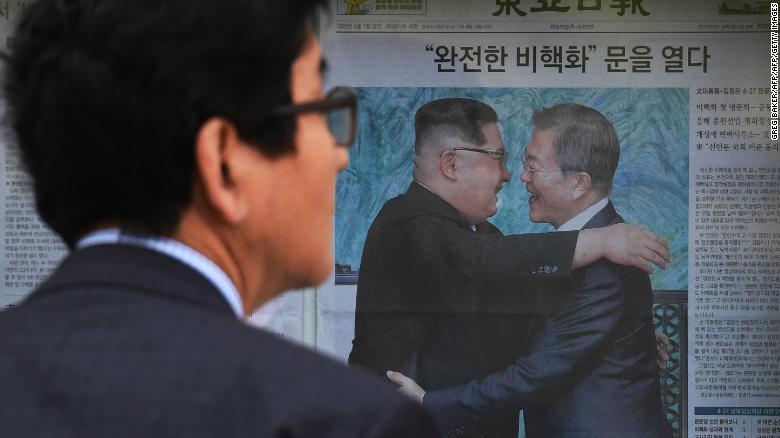
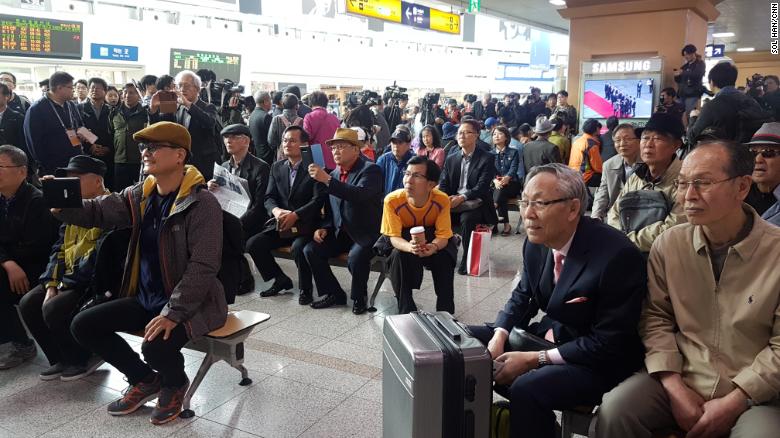
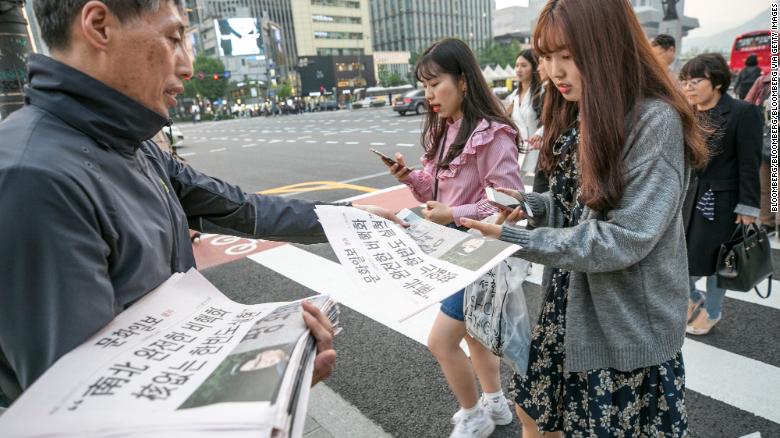
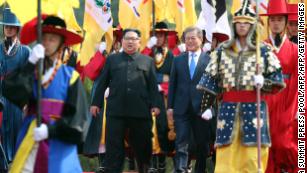
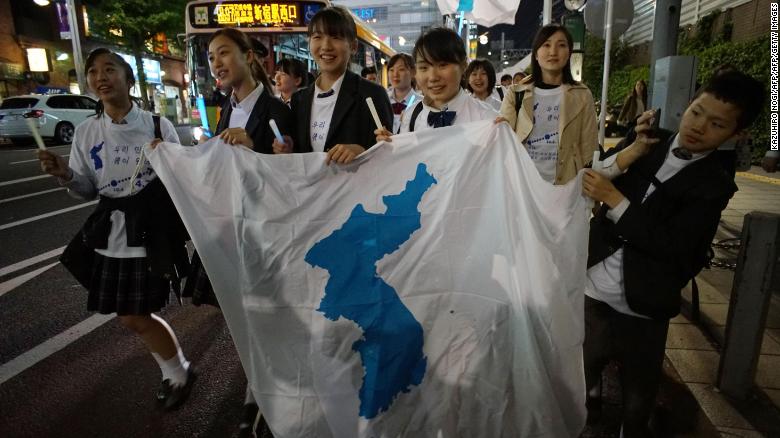
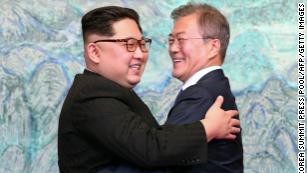
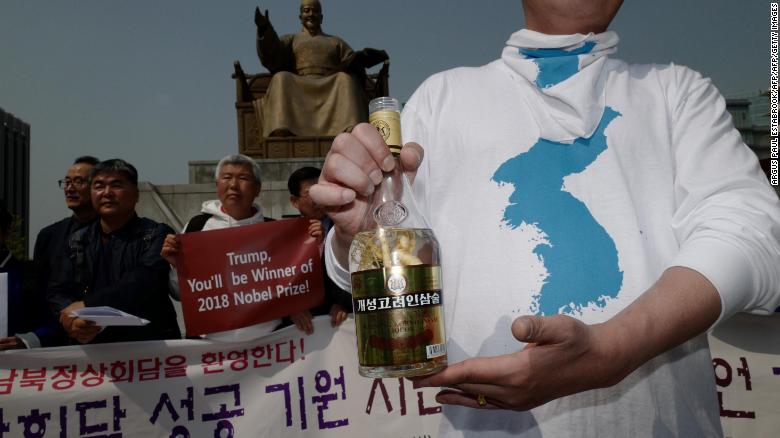
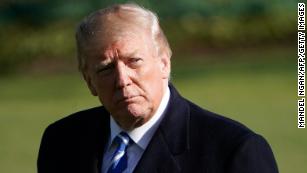
No comments:
Post a Comment